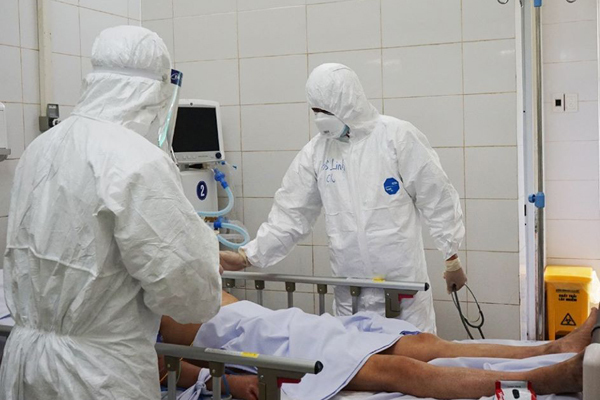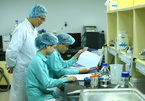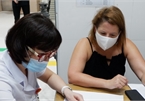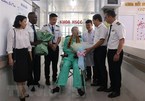 |
|
Deputy Minister Nguyen Truong Son visits Covid-19 patients in Da Nang. Photo: Le Bao - Minh Thuy
|
As of August 13 evening, Vietnam had recorded 20 Covid-19-related deaths, accounting for 2.2% of the total 905 Covid-19 infected cases.
In addition, hospitals have reported about 12 serious cases with high mortality prognosis. Meanwhile, in the first Covid-19 wave, only 2 very serious cases were recorded, including patients No. 19 and No. 91 – the British pilot.
According to Deputy Health Minister Nguyen Truong Son, the number of severe cases is still a big challenge for doctors in Da Nang City, the place where the second Covid-19 wave broke out.
“We have worked in all hospitals in Da Nang, Quang Nam and Hue and joined the local health workers to cure severe cases. However, due to the relatively severe condition of the patients, who also suffer from other chronic diseases, the prognosis is very difficult,” said Deputy Minister Son.
Over the past two weeks, the Ministry of Health’s officials and leading health experts have concentrated all resources to treat severe Covid-19 cases.
Compared with the case of patient No. 91, which has been cured, Deputy Minister Son said that the new Covid-19 cases have many differences: Firstly, many patients suffer from many other diseases at the same time, causing complications such as heart failure, kidney failure, liver failure, and exhaustion.
Thus, the response of new severe Covid-19 cases compared to patient No. 91 is very poor. As the patients’ immunity is poor, when they are infected with the SARS-CoV-2 virus their situation get worse very quickly.
“The most dangerous cases at present are those who have suffered from other chronic diseases, especially those need hemodialysis. There are patients who have been on a kidney machine for more than 10 years, which has resulted in immunodeficiency so it is very difficult for them to fight the virus," Mr. Son said.
Although the Ministry of Health and leading health experts have continuously updated the treatment regimen based on both research and practice, but in fact the treatment is different for each case.
“The treatment regimen is just the framework. For severe cases, in addition to on-the-spot consultation, there are also national consultation meetings with the most experienced doctors in the country to make treatment decisions suitable for each individual,” said Deputy Minister Son.
Based on the lessons learned from Da Nang, Mr. Son said that the most important experience is not to let Covid-19 to spread among vulnerable groups such as the critically ill people who are being treated in hospitals, the elderly, and the diabetes and kidney failure patients.
Treatment for Covid-19 should be detected early, monitored and treated as quickly as possible to limit the spread of the virus in the body as well as to limit the complications of other diseases or by Covid-19 as the case of the British pilot.
Due to the large number of critically ill patients, Vietnam is urgently implementing research on plasma extraction of the cured Covid-19 cases to transmit to people with severe and serious illness to help them recover quickly.
Many countries around the world are also applying this method. Five cured Covid-19 patients have voluntarily donated plasma.
Thuy Hanh

Vietnamese COVID-19 vaccine set for human trials in October
First phase of human trials on a made-in-Vietnam COVID-19 vaccine could begin as early as this October.

US woman donates plasma for Covid-19 treatment in Vietnam
An American woman has decided to donate blood plasma to treat Covid-19 patients in Vietnam after she was saved from the disease in HCM City.

UK, US media highlight British pilot’s hospital discharge after defeating coronavirus
The UK media has run articles highlighting the hospital discharge of a British pilot – known as Patient 91 and the most seriously ill COVID-19 case in Vietnam who spent more than two months on life support before returning home on July 12.